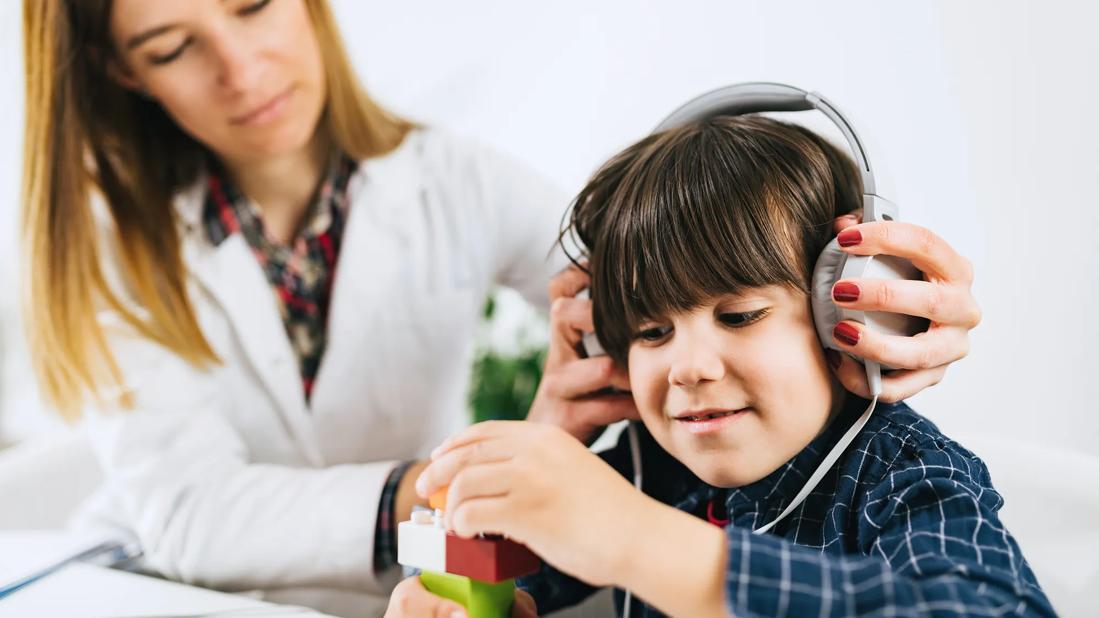Should You Have Your Child’s Hearing Tested?
Routine screenings at school are normal and important

It’s pretty typical that kids will have hearing screenings in school. Knowing if your child has trouble hearing is important for their learning experience after all. It’s also key for their lifelong well-being.
But what exactly does a school hearing test look for? And what happens if it identifies a concern?
Pediatric audiologist Donald Golberg, PhD, has answers.
What happens at a school hearing test?
Most kids have their first hearing screening at school sometime between preschool and first grade.
During the test, an examiner — like a school nurse or an audiologist — will put headphones on your child’s ears. They’ll present sounds at different volumes, frequencies or pitches into the headphones, and they’ll instruct your child to respond when they hear the sound.
If the screening shows they’re hearing as well as expected, they pass the test. If the screening shows any concerns, you’ll be advised to schedule a comprehensive hearing test with an audiologist.
How accurate are the screenings?
If your child passes the school hearing screening, you can be confident their hearing is as it should be. If it’s recommended that they see an audiologist, you don’t have to immediately assume the worst.
“These screenings only indicate that on that day, in that test environment, they didn’t pass the screening,” Dr. Goldberg clarifies. “Many factors in the initial screening can impact the results. So, just think of the next step as precautionary — a needed step to rule out the possibility of hearing loss.”
Common issues that affect the accuracy of hearing screenings include:
- Unfavorable environments: School isn’t always an optimal place for screening. Noise levels in crowded gyms or hallways near the testing area can affect the results. So can poor acoustics and echoes.
- Defective equipment: The equipment used in school hearing screenings isn’t always the most modern or in perfect working condition. For example, headphones that are too loose can affect the test results.
- Child cooperation: Kids don’t always understand the instructions they’re given or appreciate the importance of hearing screening. And they can be distracted by friends and classmates during school screenings. Often, failed screenings can be nothing more than a child who wasn’t paying close attention.
- Temporary changes: If your child is dealing with illness (like a minor middle ear infection) or has a buildup of earwax, it can affect the results temporarily. Once they’re feeling better or the wax is cleared, their hearing often returns to normal.
What happens if my child fails the screening?
If your child’s school hearing screening identifies a concern, seeking an evaluation with an audiologist is important. If you’re unsure who to contact, your child’s school or pediatrician may have a recommendation for where to seek audiology services.
A comprehensive audiologic evaluation will determine if your child’s hearing is within normal range or if they’re experiencing hearing loss.
Like during their school screening, your child will listen and respond to sounds. But this time, the test will take place in a highly controlled and calibrated test environment. Reinforce to your child that it’s important to pay attention and listen to the instructions closely during testing.
Solutions for childhood hearing loss
The earlier that hearing loss is identified, the earlier a solution can be found. So, if your child is recommended for a full hearing test, it’s important not to brush it off.
Some parents and caregivers are surprised to learn that their child isn’t hearing as well as they should. That’s especially true for children with mild hearing loss or hearing loss in only one ear (unilateral hearing loss).
“Your child might still function well, but even mild hearing loss can put your child at risk for trouble keeping up with conversation at school and throughout their lives,” Dr. Goldberg stresses.
If the test confirms that your child has hearing loss, your provider can help identify causes and appropriate next steps. Often, childhood hearing loss is due to things like undiagnosed or untreated middle ear infections and fluid buildup in your child’s middle ear.
If the cause of hearing loss is due to a temporary change, like a middle ear infection, medical intervention can address and resolve it. If the loss is more permanent, audiologists will recommend appropriate options.
Don’t hesitate to contact your child’s healthcare provider if you notice signs of hearing loss at any time. Possible red flags include:
- Seeming to ignore you when you’re speaking to them
- Listening to TV or music at a very loud volume
- Asking you to repeat yourself or saying “Huh?” or “What?” often
- Trouble speaking or pronouncing words
Proper hearing is important for your child’s development and safety. So, don’t wait to seek further care if your child’s school hearing screening recommends follow-up testing.